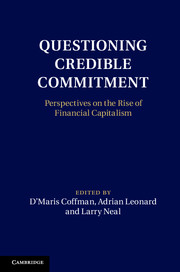Crossref Citations
This Book has been
cited by the following publications. This list is generated based on data provided by Crossref.
2014.
The Long Process of Development.
p.
1.
2014.
The Long Process of Development.
p.
203.
Neal, Larry
2014.
Handbook of Cliometrics.
p.
1.
Neal, Larry
2014.
The Cambridge History of Capitalism.
p.
1.
Le Bris, David
Goetzmann, William N.
and
Pouget, Sebastien
2015.
The Development of Corporate Governance in Toulouse 1372-1946.
SSRN Electronic Journal,
Palma, Nuno
2016.
Money and Modernization: Liquidity, Specialization, and Structural Change in Early Modern England.
SSRN Electronic Journal,
Baranzini, Mauro
and
Mirante, Amalia
2016.
A Compendium of Italian Economists at Oxbridge.
p.
193.
Dherbécourt, Clément
and
Monnet, Éric
2016.
Les angles morts de The Poverty of Clio.
Tracés,
p.
137.
Piracha, Mujtaba
and
Moore, Mick
2016.
Revenue-Maximising or Revenue-Sacrificing Government? Property Tax in Pakistan.
The Journal of Development Studies,
Vol. 52,
Issue. 12,
p.
1776.
Nijs, Luc
2016.
Neoliberalism 2.0: Regulating and Financing Globalizing Markets.
p.
77.
O'Brien, Patrick Karl
and
Palma, Nuno
2016.
Danger to the Old Lady of Threadneedle Street? The Bank Restriction Act and the Regime Shift to Paper Money, 1797-1821.
SSRN Electronic Journal,
Neal, Larry
2016.
Handbook of Cliometrics.
p.
333.
2016.
The Smoke of London.
p.
122.
Cox, Gary W.
2017.
Political Institutions, Economic Liberty, and the Great Divergence.
The Journal of Economic History,
Vol. 77,
Issue. 3,
p.
724.
Coffman, D’Maris
2018.
The Palgrave Handbook of Political Economy.
p.
529.
Dimitruk, Kara
2018.
“I Intend Therefore to Prorogue”: the effects of political conflict and the Glorious Revolution in parliament, 1660–1702.
European Review of Economic History,
Vol. 22,
Issue. 3,
p.
261.
Юдина, Ирина
and
Yudina, Irina
2018.
Bankers and politicians: mutual interests and contradictions (the historical experience of different countries).
Costa, Leonor Freire
Rocha, Maria Manuela
and
Brito, Paulo B.
2018.
The alchemy of gold: interest rates, money stock, and credit in eighteenth‐century Lisbon.
The Economic History Review,
Vol. 71,
Issue. 4,
p.
1147.
Brandon, Pepijn
2018.
‘The whole art of war is reduced to money’: remittances, short-term credit and financial intermediation in Anglo-Dutch military finance, 1688–1713.
Financial History Review,
Vol. 25,
Issue. 1,
p.
19.
Costa, Leonor Freire
Rocha, Maria Manuela
and
Brito, Paulo Brasil de
2018.
Os impactos do terramoto de 1755 no mercado de crédito de Lisboa.
Ler História,
p.
77.



